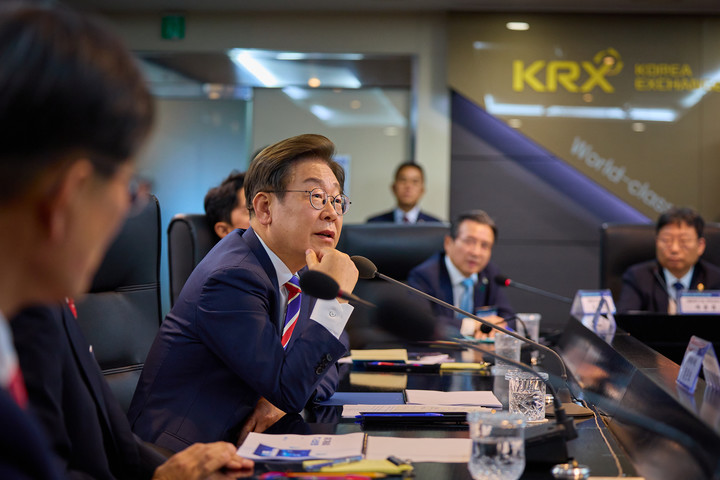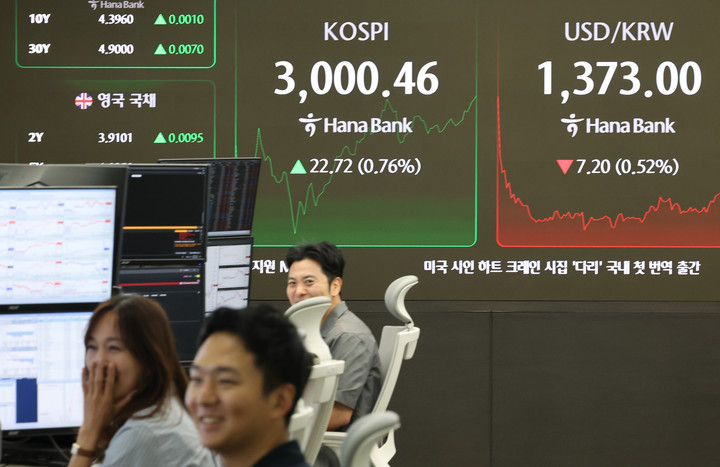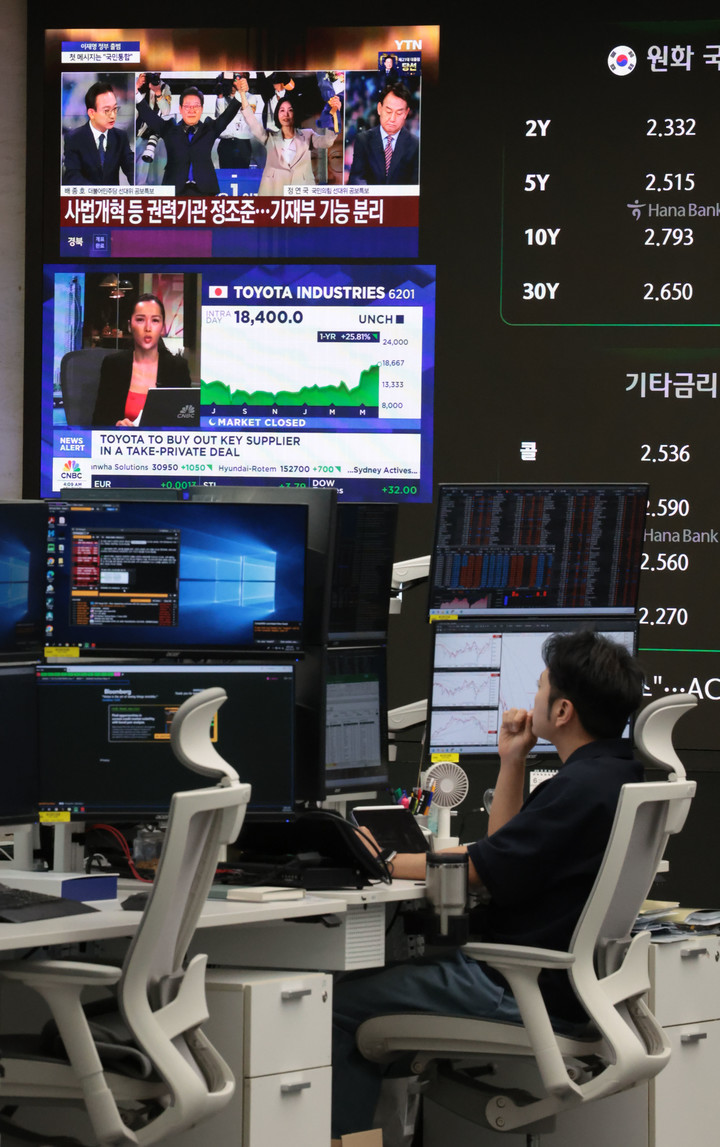Foreign investment, policy reforms, and global supply chain shifts fuel a multi-pronged rally
Risks remain, but structural changes in Korea’s capital markets suggest stronger foundations

For the first time in three and a half years, Korea’s benchmark KOSPI index has surged past the 3,000-point milestone, renewing speculation over the sustainability of the so-called ‘Lee-Jaenomics’ economic policies. While the market’s first encounter with “Samcheonpi” in early 2021 was dismissed as a fleeting product of a liquidity-driven boom, the rally that led to the June 20, 2025 breakthrough is notably different.
This surge is the product of multiple forces converging: the return of foreign investors, the policy agenda of the new administration—dubbed ‘Lee-Jaenomics’ after President Lee Jae-myung—and shifting global supply chains.
Domestically, President Lee, even during his campaign, pledged to transform Korea’s capital markets, famously declaring his goal of “KOSPI 5,000.” His reform agenda centers on improving market transparency—through moves such as introducing the ‘3% rule’ via amendments to commercial law—while concurrently easing regulations on securities, banks, and financial holding companies, and offering tax incentives. These efforts aim to reduce the long-standing “Korea discount.” Major supplementary budgets, consumption-boosting vouchers, and SOC (social overhead capital) investments designed to counter local population decline are also bolstering domestic momentum.
Another crucial driver has been the reversal in foreign capital flows. After nine straight months of net selling, foreign investors have returned on faith in a stronger Korean won and renewed policy confidence, snapping up stocks in finance and consumer sectors. Unlike the retail investor-led rally of 2021, which proved highly volatile due to the absence of foreign buyers, the current rally has attracted sustained overseas interest. As Lee Soo-jung of Meritz Securities notes, “The correction everyone’s waiting for might never come,” a sentiment that seems to be reflected in recent market behavior.
Global variables also add intrigue. While President Donald Trump’s revived tariff strategies inject new unpredictability into the international landscape, they paradoxically benefit Korea’s shipbuilding, defense, and nuclear sectors. The U.S. government has asked Korean shipbuilders for collaboration in military and merchant shipping, while the worldwide surge in defense demand is driving a structural uptrend amid volatile defense budgets. The successful Czech nuclear plant bid, led by “Team Korea,” further underscores the country’s emergence as a key player in a new era prioritizing energy security.


Industry analysts now identify four “top themes” for the latter half of the year: financials, holding companies, defense, and nuclear energy. Financials and holding companies are seen as riding the wave of capital market modernization, while the defense and nuclear sectors stand to benefit from shifting geopolitical and energy trends. Domestic consumer companies seeking to break out of stagnation are also on watch for potential upgrades. Nevertheless, key risks remain.
Should Trump-style tariff wars resurface, the impact could include sluggish exports and increased raw material price volatility. Ongoing Middle East instability could also hit energy and logistics costs. Still, despite concerns over potential market overshooting, the rally points to a correction of extreme undervaluation in Korean stocks—a necessary structural shift.
For investors, two factors warrant close scrutiny. First, the progress of policies supporting market reform: the pace of legislative action on commercial and tax law revisions, as well as the concrete details of the government’s value-up program, will directly impact market valuations. Second, earnings momentum is crucial: sectors prioritizing profitability over sheer scale—especially securities, insurance, and holding companies—are likely to see revaluations if positive policies translate into strong results.
Ultimately, KOSPI’s return to 3,000 is not the final stop, but a waypoint. When structural reforms to capital markets translate into real economic growth and corporate earnings, 3,000 will be viewed not as a summit, but as a baseline. As President Lee promised to make equity investment as viable as real estate, the Korean stock market in the second half of the year will serve as a key proving ground to see if policy, performance, and sentiment can align to realize this vision.
Much anticipation remains over how far ‘Lee-Jaenomics’ can elevate Korea’s once-sluggish economy.
Note “This article was translated from the original Korean version using AI assistance, and subsequently edited by a native-speaking journalist.”
Photo = Yonhap News Agency, Presidential Office
(MHN 관리자 )
추천 뉴스
- 1 '1조원 규모' FA-50, 필리핀에 12대 추가 수출... "올해 최대의 방산수출 성과" FA-50 전투기가 필리핀에 12대 추가 수출되며 1조 원 규모의 방산계약이 성사됐다. 필리핀은 총 24대를 도입하며 핵심 전력으로 운용 중이다.
- 2 삼성페이 3시간 반 먹통...출근길 불편 속출 2일 오전 삼성페이에서 약 3시간 반 동안 오류가 발생해 결제 서비스가 중단됐다. 현재는 정상 복구 완료됐으며 자세한 장애 원인에 대해서는 아직 파악 중이다.
- 3 트럼프, 호주에 국방비 GDP 3.5% 요구… 앨버니지 "우리가 결정한다" 지난 5월 30일 도널드 트럼프 미국 행정부가 호주에 국방비를 GDP의 3.5%까지 증액해줄 것을 요청했다. 이에 앨버니지 호주 총리는 자국의 국방 정책은 자율적으로 결정하겠다는 입장을 밝혔으며, 이미 100억 호주달러의 증액 계획을 추진 중이라고 밝혔다.
- 4 JP모건 CEO 다이먼, 미국 채권시장 균열 경고...경제 위기 가능성 고조 JP모건 다이먼 CEO가 미국 채권시장 균열을 경고하며 부채와 정책 문제를 지적, 내부 문제 해결 없이는 경제 위기 가능성을 경고했다.
- 5 ‘유엔 중시한 연대 강조’…이재명·구테레쉬, 국제협력 의지 밝혔다 주요 7개국 정상회의 참석차 캐나다 카나나스키스를 방문 중인 이재명 대통령이 17일(현지 시각) 안토니우 구테레쉬 유엔 사무총장과 간담회를 가졌다.이재명 대통령은 구테레쉬 사무총장의 유엔 수장 취임을 축하하며 감사의 뜻을 전했고, 급변하는 글로벌 환경 속에서 유엔 중심 국제사회의 단결과 상호협력이 그 어느 때보다 중요하다고 언급했다.아울러 정부는 국제평화와 번영을 위해 유엔의 역할에 힘을 보태겠다는 입장을 밝히며, 필요한 지원과 적극적 참여 의지를 표명했다.구테레쉬 사무총장은 한국 정부가 평화, 인권, 지속가능 성장, 기후변화 대응
- 6 이스라엘, 이란 아라크 중수로 폭격 예고…주민 대피 명령 (MHN 이지민 기자) 이스라엘 군은 18일(현지 시간) 이란의 아라크 중수로 주변 지역 주민들에게 대피하라고 경고했다.이스라엘 군은 18일(현지 시간) 소셜 미디어 플랫폼 X를 통해 아라크 중수로의 위성 사진을 공개하며 폭격 예고 지역을 빨간색 원으로 표시했다.군은 주민들에게 해당 지역에서 대피할 것을 권고했다. 아라크 중수로는 이란의 수도 테헤란에서 남서쪽으로 약 250km 떨어져 있다.이스라엘을 비롯한 여러 국가들은 이란이 해당 중수로에서 핵무기 제조에 사용될 수 있는 플루토늄을 생산하고 있다고 보고 있다.한편, 지난 18일
- 7 IBK기업은행, 실리콘밸리 진출 스타트업 지원 프로그램 시작 IBK기업은행이 지난 16일부터 'IBK창공 실리콘밸리 Scale-up 프로그램'을 시작하고, 8개 선발 기업에게 맞춤형 지원을 제공한다. 이 프로그램은 실리콘밸리 현지 네트워크를 활용해 스타트업의 미국 시장 진출을 돕고, 투자 유치 및 비즈니스 매칭 기회를 제공한다.
